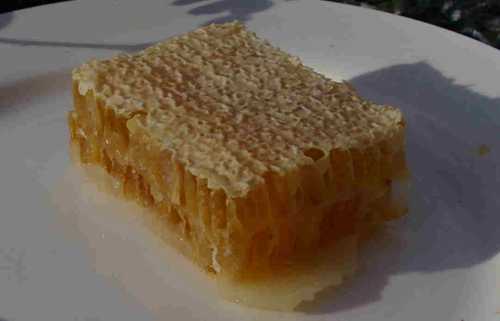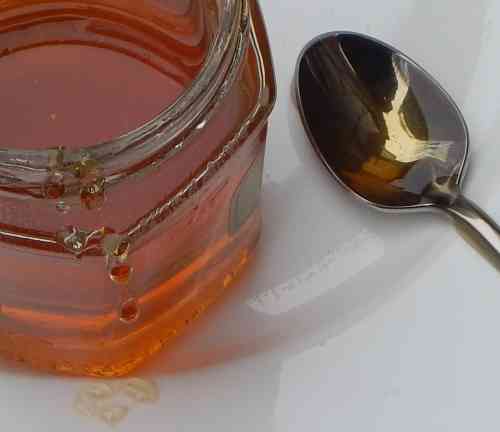Honey And Ancient Medicine
Updated: 4th March 2021
It's intriguing to read about
ancient civilizations and their remedies. A mention of early cultures
and civilizations like the ancient Egyptians, Greeks and Romans, can fire the imagination about exotic and magical
secrets yet to be unlocked and revealed to the modern world.
We may imagine a past when people were in touch with nature which revealed its hidden wisdom to receptive humans. Indeed, it’s very easy to be seduced into thinking the ancients must have used exotic, fragrant remedies that would not only cure our ills, they would be a delight to the senses. And if we say, “honey has been used in remedies since ancient times….” it might sound as though the use of honey in medicine must have been proven beyond doubt, hundreds of years ago.
To be fair, perhaps some of their medicine really was effective – but some of it certainly seems bizarre today.
Honey and Ancient Medicine
 Honey has been used in rather strange ways in ancient medicine!
Honey has been used in rather strange ways in ancient medicine!Of course, modern-day science has proven that honey does have some beneficial medicinal qualities: it has excellent anti-bacterial characteristics for a start, and there is interesting research in MRSA infection, wound and burn treatments. So it’s no surprise that there would have been a place for honey in ancient medicine. In fact, ancient cultures did use bee products in wound care, but they used honey for more besides.
So how did the ancient civilizations use honey? That depends on the civilization.
Honey In Ancient Egyptian Medicine
The Egyptians recorded their medical ideas on medical 'papyri' in hieroglyphs, hieratic, demotic or in Greek. Papyri were sheets made from the pithy stem of a water plant in ancient Egypt. Translations of the inscriptions on the papyri provide interesting insights as to how honey was used for various ills.
For example, we know that honey was mixed with exotic spices….but it was also mixed with fly blood, pig’s eyes, washerman's slops, and bird blood.
Examples of honey used in ancient Egyptian medicine are as follows:
Remedy
for blindness
"A pig's eye, antimony (a type of metal), red ochre and a little honey are finely ground and mixed together and poured into the ear of the man so that he may be cured at once.
Then recite this spell twice: 'I have brought this ointment and applied it to the trouble spot and it will remove the horrible suffering.'"
Also:
‘Take the water (humor) contained in pigs eyes, take true antimony, red lead, natural honey, of each 1 Ro (about 15 cc); pulverize it finely and combine it into one mass which should be injected into the ear of the patient and he will be cured immediately. Do and thou shalt see. Really excellent! Thou shalt recite as a spell: I have brought this which was applied to the seat of yonder and replaces the horrible suffering. Twice.” From the Edwin Smith Papyrus.
For a
swelling on the neck
"If you examine a swelling on his neck, and you find it is soft to feel with a white secretion, then you shall say concerning it:
"You are suffering from an enlarged gland on the neck; it is a disease which I will treat by an operation to guard the channels."
You shall prepare remedies to treat it with, a dressing that breaks the surface: acacia fruit, blood of the hwr-bird, fly's blood, honey, northern salt, are ground, mixed together and the gland is bandaged therewith."
For a
diseased eye:
"To clear up the pus: honey, balm from Mecca and gum ammoniac. To treat its discharge: frankincense, myrrh, yellow ochre."
For cataracts
"Mix brain-of-tortoise with honey. Place on the eye and say:
There is a shouting in the southern sky in darkness, There is an uproar in the northern sky, The Hall of Pillars falls into the waters. The crew of the sun god bent their oars so that the heads at his side fall into the water, Who leads hither what he finds? I lead forth what I find. I lead forth your heads. I lift up your necks. I fasten what has been cut from you in its place. I lead you forth to drive away the god of Fevers and all possible deadly arts."
Occipital neuralgia (chronic headache disorder):
"If he is ill in his nape and his eyes are dim-sighted, then thou shalt say concerning it:
"it is (due to the fact) that the vessels of his nape have received the disease."
What is done against it: myrtle, washerman's slops, pignon, fruit of a 3ms, are mixed with honey, applied to his nape and (it) is bandaged therewith for 4 days."
A boil in the throat:
"If thou examinest an enlarged gland in the throat of a man which has arisen through an attack of bile or matter in any limb of a man.......then thou shalt say concerning it:
"(it is) one suffering from an enlarged gland in his throat, matter running in its place; it is a disease which I will treat".
Thou shalt prepare for it remedies to cause it to decay by means of medicines: onion, date-wine, thwj, cumin, northern salt, yeast-fluid, powder of beans, fruit of 11 ml, honey, oil, are mixed together and (it) is bandaged therewith for 4 days, until he gets well."
Softened tubercular gland
"If thou examinest a cystoid enlarged gland on his neck....... then thou shalt say concerning it:
"(it is) one suffering from cystoid enlarged gland on his neck; it is a disease which I will treat by an operation that guards the vessels."
Thou shalt prepare for it remedies to treat it with a dressing that breaks the suppurating membrane: acacia seyal, tbwj, fruit of rim}, blood of the hwr-bird, fly's blood, honey, 'maw, spry, northern salt, are ground, mixed together and (it) is bandaged therewith."
Use of beeswax
Beeswax was also used in Ancient Egypt. The Ebers Papyrus (1550 B.C.) reveal that beeswax was the main ingredient in many recipes for the preparation of ointments and creams used to to treat burns and wounds and to soothe joint pain.
Honey And Ancient Greek Medicine
Hippocrates, the Greek philosopher, was convinced about the uses of honey in medicine, and used honey in different formulations for treating a range of complaints:
- For pain, he used oxidhoney (honey and vinegar).
- For thirst Hippocrates favoured mead.
- For rapid onset of fever and symptoms such as headache, chills or muscle and joint pains (acute febrile diseases), Hippocrates would advise honey and water mixed with various other substances.
- To treat ulcers, Hippocrates used two formulations as enema:
- strong white vinegar boiled together with honey, sodium carbonate, alum and an amount of Choles
- boiled together: honey and copper oxide.
Hippocrates also said that for chest diseases, he thought:
"barley soup is better than all other cereal foods for chest diseases - also vinegar and honey, because they bring up phlegm"
Hippocrates also recommended the use of beeswax in case of purulent tonsillitis.
Celsus (a Greek philosopher) was reportedly also familiar with the therapeutic usage of honey.
Theriac or theriaca was a medical concoction originally formulated by the Greeks in the 1st century AD. Theriaca andromachi or 'Venice Treacle' contained 64 ingredients. In addition to viper flesh and opium, it included cinnamon, agarics and gum arabic. The ingredients were pulverized with honey, and reduced to a type of paste.
 Honeycomb.
Honeycomb.
Honey And Medicine In Ancient Rome
- Plinios the Elder stated in his book "Historia naturalis" (37 volumes) ― "The Arabians are producing honey from the reed for medical use only." It also states that wool can be applied with honey for healing old wounds.
- Greek physician Galen devoted a whole book Theriaké to theriac. One of his patients, Roman emperor Marcus Aurelius, took it on regular basis.
- Beeswax was also used. Doctors applied a cream known as “cold cream”, which contained olive oil, beeswax and rose water for the treatment of burns, wounds, cuts, bruises and fractures.
Resources
- A Spotlight on the History of Ancient Egyptian Medicine By Ibrahim M. Eltorai.
- Fratini F, Cilia G, Turchi B, Felicioli A. Beeswax: A minireview of its antimicrobial activity and its application in medicine. Asian Pac J Trop Med. 2016 Sep;9(9):839-843. doi: 10.1016/j.apjtm.2016.07.003. Epub 2016 Jul 26. PMID: 27633295.
If you found this page helpful or interesting, I'd really be grateful if you would share it with others - if not this page, perhaps another, such as Gardening For Bees.
Thank you so much :) .

